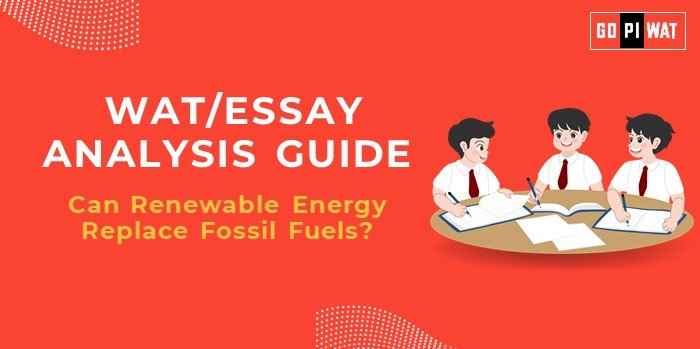📋 Can Renewable Energy Replace Fossil Fuels?
🌍 Understanding the Topic’s Importance
Renewable energy’s potential to replace fossil fuels is central to discussions on sustainable development and economic transformation. This topic intersects with economics, environmental policy, and technology, making it highly relevant for B-school students.
📝 Effective Planning and Writing
- Time Allocation:
- 🕒 Planning: 5 minutes
- ✍️ Writing: 20 minutes
- 🔍 Review: 5 minutes
- Preparation Tips: Gather key statistics on renewable energy adoption, and identify challenges and future trends to create a balanced essay.
🎯 Introduction Techniques for Essays
- ⚖️ Contrast Approach: “While fossil fuels have been the mainstay of industrial growth, the environmental costs and finite nature of these resources have spurred a significant shift toward renewable energy.”
- 💡 Solution-Based Approach: “Renewable energy offers a pathway to sustainable development, but can it realistically meet global energy demands alone?”
- ⏳ Timeline Approach: “From the first large-scale wind farms to today’s affordable solar panels, renewable energy has evolved rapidly over the past few decades, prompting discussions on its potential to replace fossil fuels.”
🏗️ Structuring the Essay Body
- 🌟 Achievements: Discuss cost reductions and technological advances, such as cheaper solar panels and improved wind turbines.
- 🔍 Challenges with Comparative Analysis: Detail issues like intermittency, and compare with countries like Denmark that have successfully integrated renewables.
- 🔮 Future Outlook: Include expected improvements in storage and grid technology and forecast renewable energy’s role in upcoming years.
🔚 Concluding Effectively
- ⚖️ Balanced Perspective: “The promise of renewable energy is undeniable, but a reliable and affordable energy future may require a gradual transition involving multiple sources.”
- 🌍 Global Comparison: “As countries like Germany demonstrate, a large-scale shift to renewables is possible but will depend on overcoming substantial technological and economic barriers.”
📊 Analyzing Successes and Shortcomings
Key Achievements: Significant reductions in the cost of solar and wind; job creation and economic growth in renewables.
Ongoing Challenges: Reliability issues due to intermittency; infrastructure costs.
Global Context: Success in Germany and Denmark, where renewables meet a significant share of energy needs.
🛠️ Recommendations for Sustainable Progress
- 🔋 Investment in Energy Storage: Prioritize research on affordable and efficient storage solutions.
- ⚡ Grid Modernization: Update grid infrastructure to manage renewable inputs effectively.
- 📜 Policy Support: Encourage policies that promote renewables while managing transition challenges.
✍️ Sample Short Essays on the Topic
- ⚖️ Balanced Perspective: “While renewable energy has come a long way, fully replacing fossil fuels presents challenges. With advancements in storage and grid technology, a combination of renewable sources and transitional fuels could pave the way for a sustainable energy future.”
- 💡 Solution-Oriented: “Investing in renewable energy technology and storage solutions could eventually replace fossil fuels, but careful planning and gradual adaptation are essential for stable energy supplies.”
- 🌍 Global Comparison: “Countries like Germany and Denmark demonstrate renewable energy’s potential, though their achievements also underscore the need for substantial investments in infrastructure and technology to support a fossil-free future.”


